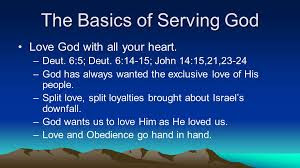 |
| Commander of the Lord's Army |
A Long Journey
The Israelites have journeyed 40 years in the desert to finally arrive at the land the Lord had promised to their ancestors. Along the journey, they ate manna from heaven daily and followed the leadership of Moses and Aaron, and then now Joshua. Miraculously, when they reached the flooding waters of the Jordan River, while the Levitical priests carried the Ark of the Covenant, the Israelites walked across the river bed on dry ground. After they were safe at Gilgal, the flood waters returned as before. One man from each tribe (12), placed a stone at Gilgal as a memorial to share with future generations.
The military aged men along the journey had all been circumcised, but while in the desert, none of their sons had been. The Lord God told Joshua to make flint knives and circumcise all the Israelite males before proceeding to Israel. Then they celebrated the tradition of Passover and ate produce from the land of Canaan. The next day, the manna, which they had been receiving for 40 years, ceased. The day following Passover, they began eating produce from the land of Canaan.
 |
| The Israelites ate manna in the wilderness for 40 years. |
Marching Around the City
Joshua followed the Lord's instructions for how to capture the city of Jericho. They marched around the city one time daily for 6 days, while the priests blew rams' horn trumpets. On the seventh day, they marched around the city 7 times, while 7 priests blew the trumpets. When Joshua commanded on the 7th day, the army shouted and the walls of the city fell, just as the Lord told them it would.
The Sin of Achan
Joshua said in chapter 7:25, "Why have you brought this trouble on us? The Lord will bring trouble on you today." Then all of the Israelites stoned Achan and his family and burned everything. They piled stones on top, and the Bible says, this punishment turned [away] the fierce anger of the Lord.
This passage troubled me as being too severe, but I did read online that this is a parallel to how all of mankind was punished for the sin and disobedience of Adam and Eve. More at this link.
In the New Testament, in Romans 5:18-19, we learn that all of mankind is saved by the obedience of one man--God in human flesh--Jesus Christ. The theme of propitiation of sin is a thread throughout the Old and New Testament. The solution to this ongoing problem of sin is fixed and finished in the sacrifice of Jesus Christ for all of mankind by faith. Jesus is described as our advocate (lawyer) who presents himself as the holy requirement that bridges the gap between the sin of mankind and the holiness of God.
This passage troubled me as being too severe, but I did read online that this is a parallel to how all of mankind was punished for the sin and disobedience of Adam and Eve. More at this link.
In the New Testament, in Romans 5:18-19, we learn that all of mankind is saved by the obedience of one man--God in human flesh--Jesus Christ. The theme of propitiation of sin is a thread throughout the Old and New Testament. The solution to this ongoing problem of sin is fixed and finished in the sacrifice of Jesus Christ for all of mankind by faith. Jesus is described as our advocate (lawyer) who presents himself as the holy requirement that bridges the gap between the sin of mankind and the holiness of God.
All of the city of Jericho was burned, except the silver, gold, bronze, and iron articles were put into the treasury of the Lord's house. By grace, Rahab, and all of her household, were brought out of Jericho before everything else in the city was burned. Because the city of Jericho was given to the Israelites as an inheritance, Joshua pronounced a solemn oath that anyone who would undertake to rebuild Jericho would be cursed by God.









